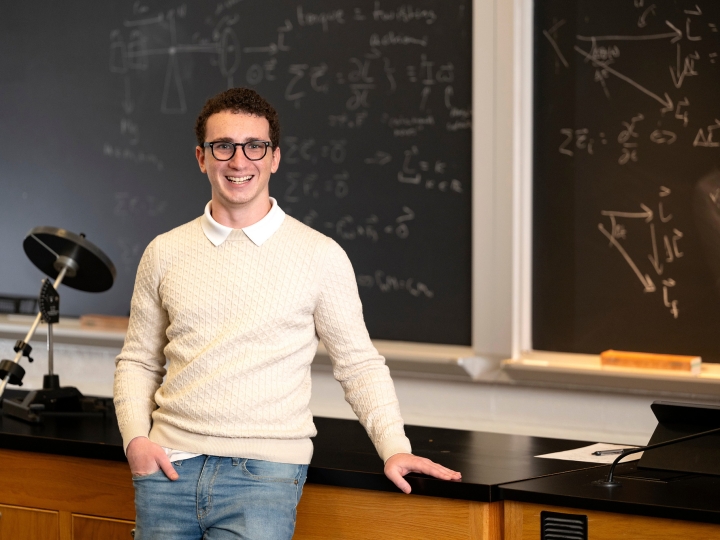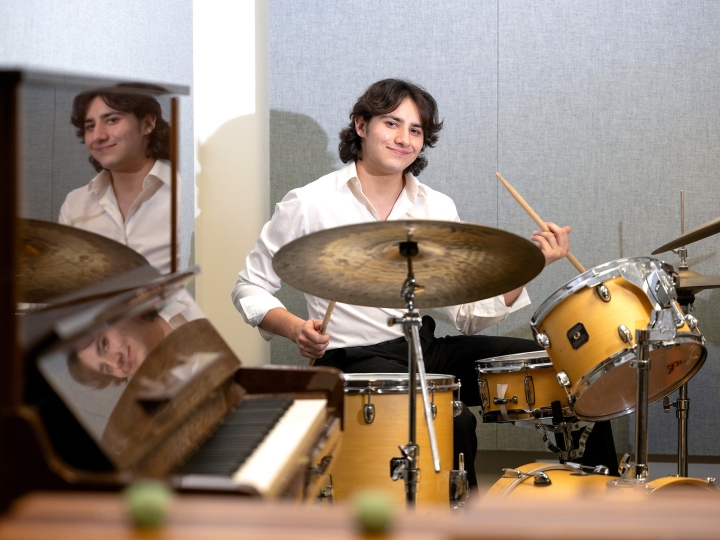
Marion Duval ’25, Cell Biology/Biochemistry
January 14, 2022
Duval is analyzing the genes of insects to identify bacteria-killing sequences that could be harnessed in fighting the global antibiotic resistance crisis. Photo by Emily Paine, Communications
[My] project perfectly bridges my concerns about antibiotic resistance and my academic interest in biochemistry. It’s really exciting to be getting my education while also working to overcome a big, global problem.
How many first-year college students get to be on the front line of solving some of the world's most challenging scientific conundrums? Marion Duval '25 knew that at a large research university, with countless graduate students and ultra-competitive labs, the answer was likely to be not many.
"That's not the case at Bucknell, where the majority of the students are undergraduates," says the cell biology/biochemistry major from Middleton, Mass. "The opportunity to do research right away was one of the biggest things I knew I wanted coming into college — and the main reason I chose to enroll here."
As a Presidential Fellow, Duval is one of the numerous Bucknellians who start their college career in the lab, using cutting-edge technologies and techniques to develop solutions for pressing scientific issues. Ever since her first semester, Duval has been examining one of today's biggest threats to global health, food security and socioeconomic development: the worldwide antibiotic resistance crisis.
Due in part to the misuse and overuse of medicines, infectious bacteria are developing resistance to antibiotics in all corners of the globe. A growing number of common infections — from pneumonia and tuberculosis to sexually transmitted diseases — are becoming more difficult to treat as a result.
"If we don't come up with another alternative, then antibiotics will pretty much become useless at some point in the future," Duval says.
Duval first learned about the crisis while in high school and jumped at the chance to study the phenomenon firsthand at Bucknell. In collaboration with Professor Moria Chambers, biology, and Professor Sarah Smith, chemistry, Duval is analyzing the genes of insects to identify bacteria-killing sequences that could be harnessed for clinical use.

Goldwater Scholar Marion Duval '25 began conducting cross-disciplinary research in biology and chemistry during her first year at Bucknell. Photo by Emily Paine, Marketing & Communications
Powerful Proteins
The research looks specifically at peptides, the short chains of amino acids that form proteins — all of which are produced from the information housed in DNA. Duval began by paring down a dataset of nearly 500 different peptide chains derived from various insect species, including fireflies and fruit flies. After creating a workable set of around 200 unique sequences, she then parsed through the data, looking to isolate peptides with characteristics that might destroy bacteria.
"Right now, we're mostly interested in whether different regions of the peptide sequences attract or repel water," Duval explains. "If one side is more hydrophobic and one side is more hydrophilic, that may affect its ability to attach to a bacterial cell in order to kill it."
Eventually, Duval and her professors will synthesize these sequences in the lab to test against a range of bacterial species, making modifications to improve the functionality of the peptides as they go.
"This project perfectly bridges my concerns about antibiotic resistance and my academic interest in biochemistry and its medical applications," Duval says. "It's really exciting to be getting my education while also working to overcome a big, global problem."
Experimental Education
Interdisciplinary by design, Bucknell's cell biology/biochemistry major weaves biology and chemistry with math and physics to produce well-rounded scientific thinkers. It was the ideal major for Duval, who nurtured equally strong affinities for biology and chemistry while in high school.
"Chemistry was my favorite class, but I loved learning about the biological applications of chemistry concepts," she says. "When I was looking to apply to college, I knew that these were my two favorite subjects, so why not combine them?"
But the classroom isn't the only place Duval dabbles in multiple skills. She also experiences the best of both worlds in the lab, where opportunities for exploration through various research projects abound.
"There are always multiple projects running in Professor Chambers' lab, so there's tons of collaboration between students and professors," Duval says. "While my primary research doesn't deal with live subjects, I've had the chance to get a taste of work that does."
During fall 2021, Duval helped rear firefly larvae that were hatched in an "eco shoebox" filled with dirt, moss and leaves. The experiment was a foundational piece of research being conducted by Professor Sarah Lower, biology, whose studies on fireflies have been featured in prominent media such as The Guardian.
"I've always been very curious, so getting to observe explanations for why things happen in nature up-close is one of my favorite things," she says. "I love that you can see the consequences of both chemistry and biology in real life and understand what's actually happening behind the scenes."

